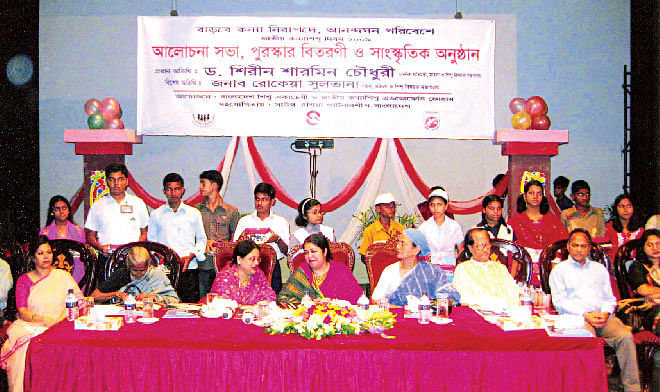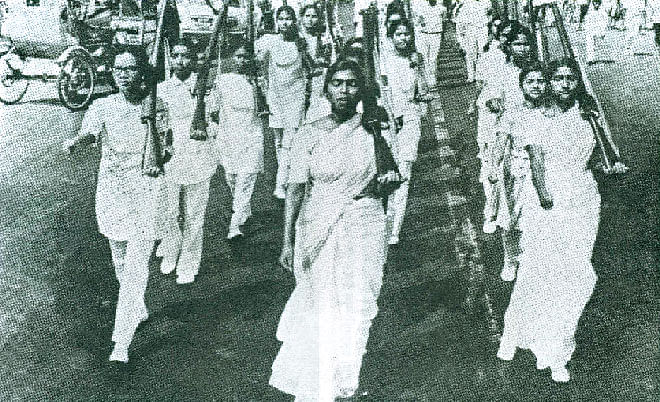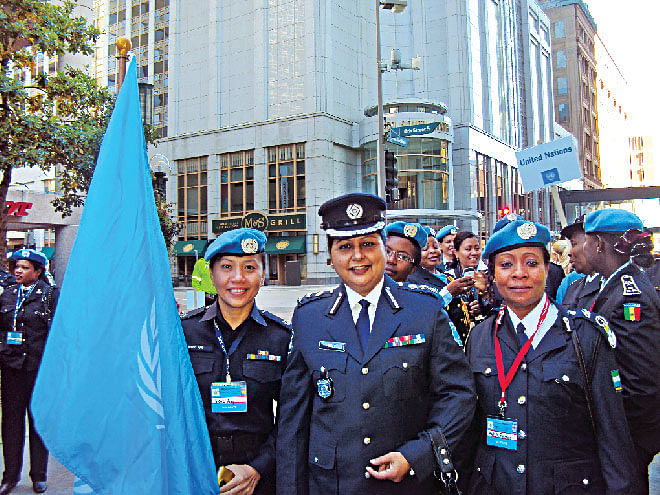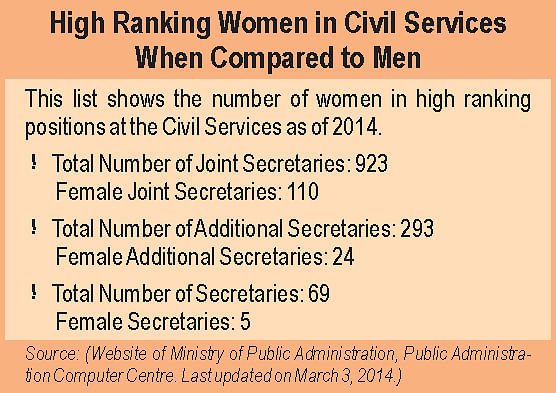WINNING IN A MEN'S GAME

It's a man world. Be it business, the arts, sports, media, politics, movies; women have always had to be satisfied with a supporting role while the “man” gets to be the hero. As with other professions, men dominate the higher ranks of the civil services. Currently, we have only five female secretaries employed by different ministries, while the list compiled by the Ministry of Public Administration shows the total number of public service secretaries to be 69.
The scene, fortunately, is changing. Women are willing to take the risk of joining civil services, a field that till date has been controlled by men. They are ready to face the discrimination, the doubts, the suspicion, the non-cooperation, to emerge triumphant and empowered. Even though the numbers might not present an encouraging picture, more and more women are aiming towards the higher rungs of the civil service hierarchy. And it's all thanks to the trailblazers who have inspired women to affect change by being leaders and not mere followers.
Nazneen Sultana was an active participant of the students' movements during the war of liberation. She was the General Secretary of the student union of Badrunessa College. She inspired girls of her age to unite, and take active part in the Liberation War of the country. It's only fitting that a woman with such courage and determination would be appointed as the first woman Deputy Governor of Bangladesh Bank.
“Apart from taking up the active role of organising rallies and participating in them during the liberation war movement, I also volunteered as a nurse tending to the injured freedom fighters and supplying our soldiers with medicines,” says Nazneen of her role as a freedom fighter.

Nazneen graduated with a degree in Physics from the University of Dhaka and joined Bangladesh Bank as an assistant computer programmer in 1980. At that time, computer use was still a rarity in the country. Apart from Bangladesh Bank, Adamjee Jute Mills and Atomic Energy Commission were the only other organisations to own computers. Nazneen Sultana, therefore, has another feather in her cap, as she was one of the first computer programmers of the country.
When she expressed her intention to work rather than be a stay-at-home mother, Nazneen received mixed reactions from the people around her. She was advised to join an educational institute as a teacher but very few motivated her to follow her dreams of joining the civil service. Her parents, luckily, were encouraging but she still had to face taunts and jibes from those who doubted her abilities.
“Social expectations from a woman were very different back then as opposed to what you'd see at present. While I was working as a civil servant, most women in my social circle were housewives, focused solely on taking care of their children. And they'd often try to make me feel guilty, stating that my children were being deprived of my care and attention because I was a working woman. But I believe that I spent quality time with my kids, and my work never interfered with the upbringing of my children,” she says, dismissing claims that a working woman can't be a good mother.
Saida Muna Tasneem, Director General, (United Nations and Human Rights) Ministry of Foreign Affairs, graduated with a degree in Chemical Engineering from BUET, but her father had other plans for her. Tasneem's father, who was also a civil servant, believed that his daughter could bring about a change in the civil service sector. He encouraged her to take the Bangladesh Civil Services exams, which she topped. Tasneem then went on to join the foreign services in 1993, and was appointed as joint secretary of the Ministry of Foreign Affairs in 2009, a post that she currently holds.
“Even as a student of BUET, I would find myself in a class filled with boys and very few girls. But being in the minority was never a deterrent. This is a man's world and I knew that I needed to succeed to prove my worth,” says Tasneem.
It's a tough world if you want to be good at everything, says Tasneem, but one should never stop trying to be the best, be it in your professional life or your personal one. “There is a very delicate balance between one's professional and family life, and a woman needs to know how to maintain this balance. Your work is a priority but so are your children, your parents, your spouse. If you are a woman, you need to be great at your job but you also need to take care of your family's needs. A woman needs to have three times the energy of a man,” adds Tasneem.

In stereotypical settings, the mother-in-law makes the loudest fuss when her daughter-in-law decides to work outside of home. This, however, did not hold true for Senior Secretary to the government and member of the Privatisation Commission, Rokeya Sultana. Her mother-in-law was her staunchest supporter, as she motivated her to continue working even after her marriage. Both her mother and her mother-in-law were married off before they could complete their education, and they made sure that Rokeya's dreams were not left unfulfilled. Even during her childhood, her parents ensured that both their children were given equal opportunities and rights.
“My brother inspired me to be independent and well-informed. My family was very supportive of my decision but this is not the case with many women. They have to depend on their will and determination to succeed in the public services,” says Rokeya.
Rokeya studied English Language and Literature at Dhaka University, before attaining the second position on her BCS exams. She then joined the Audit and Accounts Cadre. She was the only woman from the 11 people selected for the department on the basis of merit. Rokeya's list of achievement is long and varied; she has been the deputy secretary of the Economic Relations Division, the joint secretary of the Ministry of Fisheries and Livestock, and the additional secretary and chief controller of the Import and Exports department. She had also been the secretary of the Ministry of Women and Children Affairs, as well as the secretary of the Rural Development and Cooperatives Division.
The women police unit was launched with only six members in 1974. When Deputy Inspector General (DIG) Milee Biswas joined the force's cadre post in 1988, less than one percent of the total police force was comprised of women. However, over the years, more and more women joined the force, increasing the number to 6000. Even now, women make up a barely significant four percent of the police force, but we can see the change taking place and it's all thanks to pioneers such as Milee Biswas.
When she decided to join the cadre after completing her education, some of her family members were sceptical that she would successfully be able to complete her training. But she has proved to every sceptic that gender is not important to make it big in any profession; all one needs is perseverance and commitment to one's job.
“If you want to serve your nation, there is no better way to do that than joining the public services,” says Milee. “Even though there were very few women joining the police force at my time, I felt enthusiastic about it and felt like I could do a good job if given a chance.”
Jesmin Tuli, Joint Secretary of the Election Commission Secretariat, was always interested in joining the electoral system. Her decision was further reinforced when she noticed the lack of women working for the Election Commission. Thus, even though she was a student of Chemistry, Jesmin took the BCS exams and then sat for a separate exam conducted by the Election Commission, before joining the department in 1984. In her thirty years at the commission, Jesmin has witnessed several evolutionary changes of the electoral system of the country.
“Many other girls joined the commission along with me back in 1984 but due to various reasons the numbers kept dwindling till there were only two of us left from that batch,” says Jesmin.
It was not that the said women left their jobs because they were incapable or didn't want to work anymore, says Jesmin. In fact, most of them left their job at the election commission to take up jobs elsewhere and are currently doing quite well for themselves, she adds.
More often than not, women are constricted by insensitive attitudes and lack of opportunities at their workplace, she adds. “If the society around them was more positive, women could have achieved higher goals,” says Jesmin.
Saida Muna Tasneem echoes Jesmin's sentiment, adding that the civil service works like a pyramid, with more women recruited at the base but very few women employed at the top. Women are always kept at the fringes while stereotypical mindsets decide what jobs would “suit” a woman more.
“Women are placed in ministries which look over 'soft issues'. Why can't we see a woman as the defence secretary of the country? Why can't a woman be the finance secretary? Why can't you make the principal secretary to the Prime Minister a woman? Are you saying that there are no capable women who can undertake such responsibilities? I am sure there are, but there's a lack of interest in pulling them up to decision making posts,” she adds.
The handicap for a woman is that she is a woman. Thus, she can't or isn't given the opportunity to communicate as frequently or as intimately with her male boss as her male colleagues, says Saida. She is supported in her statement by Rokeya Sultana who says that less frequent communication with upper level male colleagues or superiors can be an impediment to a woman's growth in the civil services.
“Women need to fulfil many other obligations and so they tend to complete all their office duty on time and then leave for home. Men, on the other hand, have more time to strengthen their network by being in touch with their co-workers and male bosses,” adds Rokeya.
Women also have to face problems when they seek maternity leave. Even after their child is born, women are forced to leave them in the care of some other person for a lack of day care centres at their workplace.
“When I joined the Bangladesh Bank, we would get three months maternity leave. That was one of the biggest challenges faced by the working women of the 1980s. Thankfully, at present women get six months maternity leave if they are working for the civil services,” says Nazneen Sultana.
The common belief that women cannot perform well at higher ranks also creates obstructions for a woman's growth in the public service, says Nazneen. This creates a feeling of insecurity within women themselves, and they are made to feel inadequate about themselves.

“Women start believing that they can't perform at higher ranking positions as well as a man can because they are repeatedly told that by everyone around them. I believe that if you want to see more women in decision making posts, you need to change the way a woman views herself and her abilities. Only then will the society around her change,” she adds.
A woman's perspective is more varied and encompassing than a man's way of looking at things, says Jesmin Tuli. And so the country will benefit if more women join the civil services, she says.
Women also generally tend to be less corrupt and more honest than their male counterparts, adds Rokeya Sultana. “Civil service is also not bereft of corruption. A woman's complete focus is on her work, as she is determined to prove herself in a man's world. Thus, women will generally be more honest to their job. Women in higher positions can also ensure the fast-tracking of result oriented projects. Our country can definitely do with more honest, efficient civil servants,” she says.
Women can make more informed decisions while keeping in mind the needs of other women, says Nazneen Sultana. “When I became the DG of Bangladesh Bank, I sent a circular to other banks that stated that they should include a childcare centre within their organisations as part of their CSR activities. If one bank can't do it then three to four banks should collaborate on creating a centre for the mothers working in their banks. In this way, mothers can feel secure about their children and concentrate fully on their job,” says Nazneen.
Nazneen further adds that we need to change the mentality of considering taking care of children to be solely a woman's responsibility. “Men and women need to share their responsibilities. Whether it be taking care of children or other household chores, a man needs to do his part to make life easier for his wife,” she says.
More and more women are joining the civil services but the numbers at the top need to increase. These women and their success stories can truly inspire the women who wish to serve their country but falter in their steps when they think of the struggles and the discrimination awaiting them. They have proven that women, if given the opportunity, can take equal care of their homes as well as their country, leading governments and changing the way the public sector works.

 For all latest news, follow The Daily Star's Google News channel.
For all latest news, follow The Daily Star's Google News channel. 



Comments